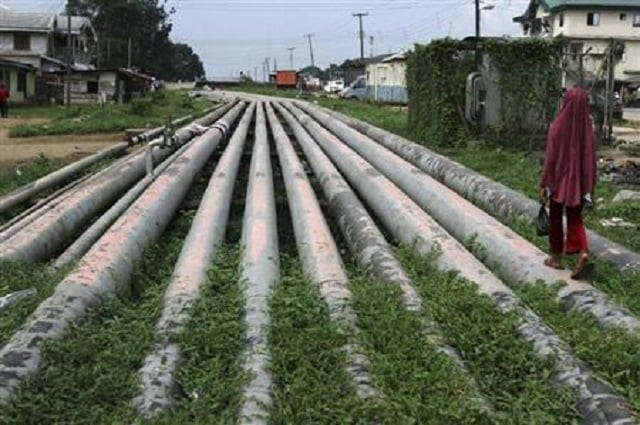In Nigeria, four in ten people in the workforce are unemployed or underemployed: stats office
The combined proportion of people unemployed or underemployed was 40 per cent at the end of September

File Photo: A girl walks on a gas pipeline running through Okrika community near Nigeria's oil hub city of Port Harcourt December 4, 2012.
PHOTO: REUTERS
The regional power climbed out of its first recession in a quarter of a century in the second quarter, but economic growth remains sluggish. That has lead to a drought of work opportunities, contributing to a cycle of poverty that drives Nigeria's yawning wealth inequality as well as social unrest.
Shell 'liable for rights violations' in Nigeria: Amnesty
"A return to economic growth provides an impetus to employment," Nigeria's National Bureau of Statistics (NBS) said in a report released on Friday. "However, employment growth may lag, and unemployment rates worsen especially at the end of a recession and for many months after," the stats office said, adding that it expects unemployment to peak in the fourth quarter of 2017.
By the end of September, Nigeria's economically active or working population was 111.1 million people, said the NBS. Unemployment has increased to 18.8 per cent of that population from 16.2 per cent at the end of June, it said.
Pakistan diversifies LNG imports with first cargo from Nigeria
The combined proportion of people unemployed or underemployed was 40 per cent at the end of September, up from 37.2 per cent by the end of June, said the NBS report. Earlier this month, ratings agency Fitch cut its 2017 economic growth forecast for Nigeria to 1 per cent from 1.5 per cent.
The administration of President Muhammadu Buhari, who campaigned on vows to fix Nigeria's economy, has struggled to follow through with plans to reduce the country's dependence on oil. Much of Nigeria's recovery since the second quarter has been driven by crude production, which accounts for roughly two-thirds of government revenues, despite the government's assertions they are investing in infrastructure and key industries such as agriculture to drive employment and boost growth.




1725099588-0/BeFunky-(41)1725099588-0-208x130.webp)














COMMENTS
Comments are moderated and generally will be posted if they are on-topic and not abusive.
For more information, please see our Comments FAQ